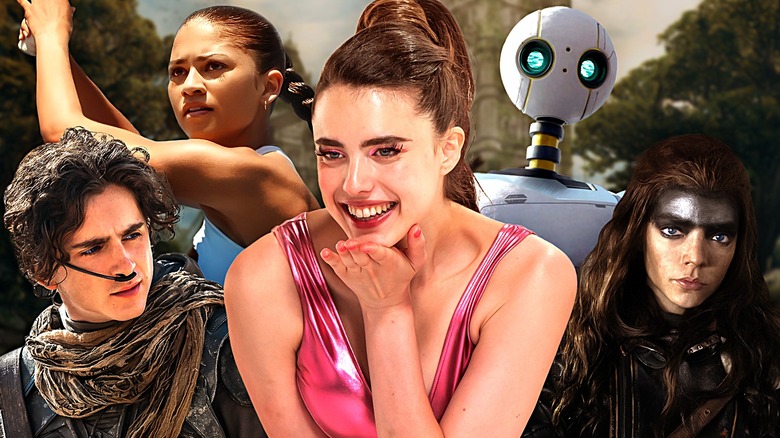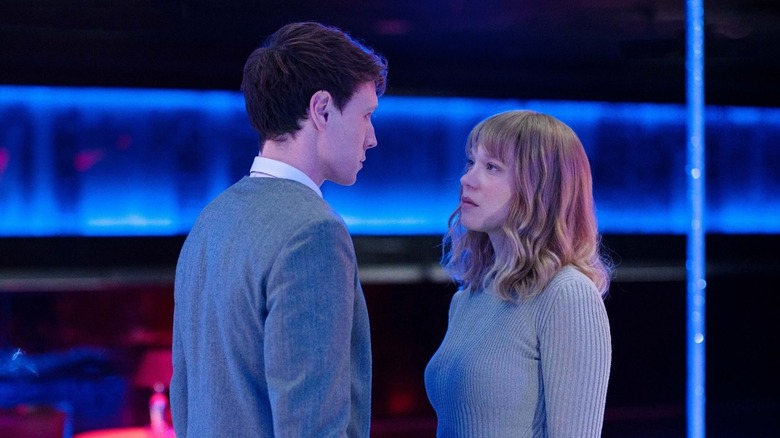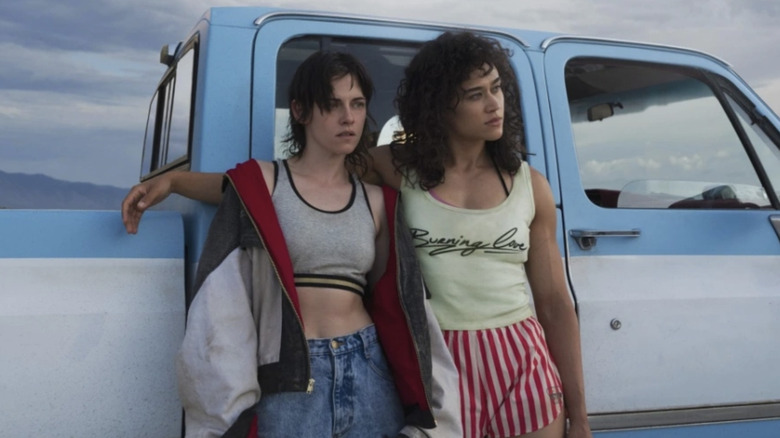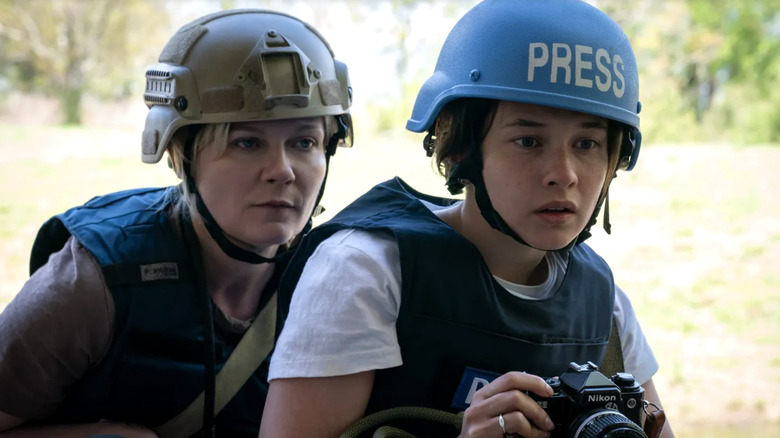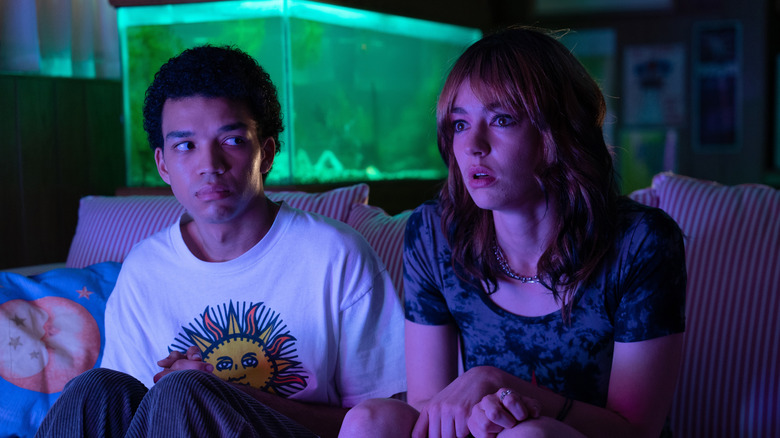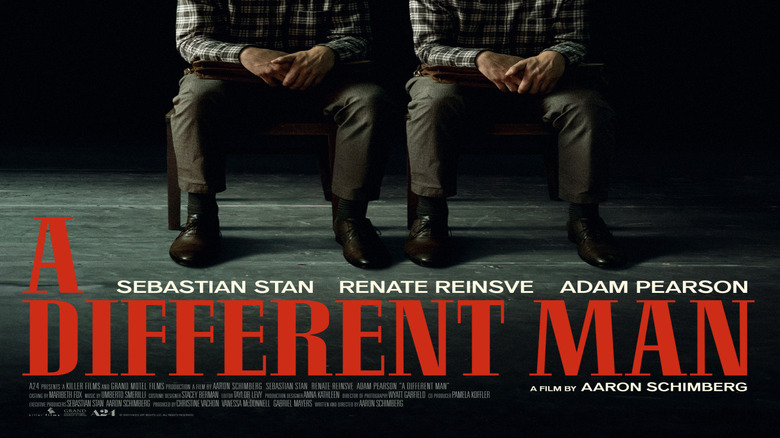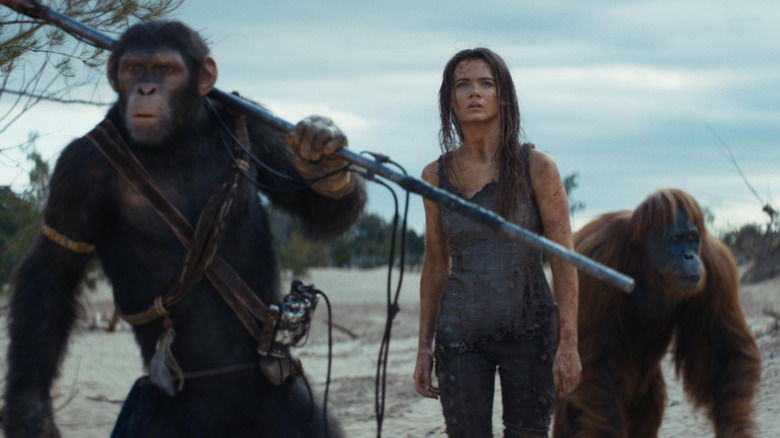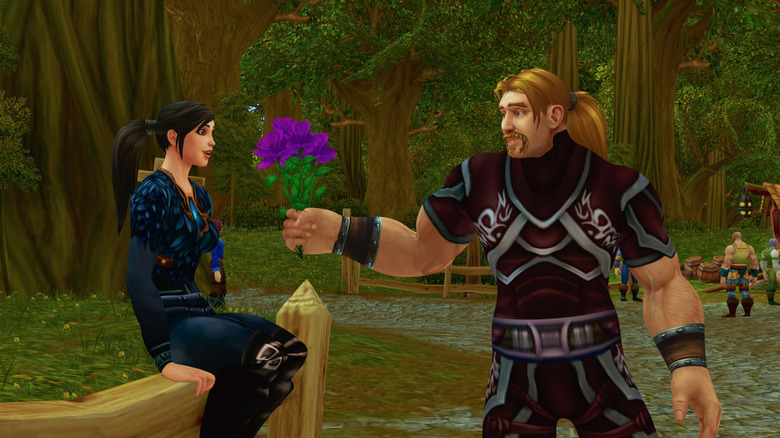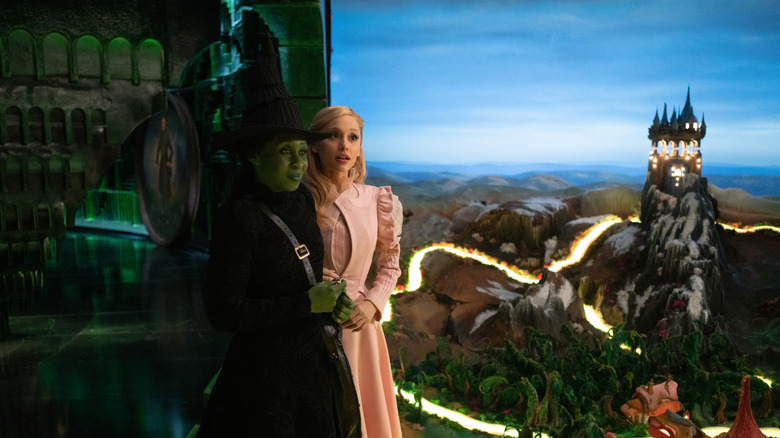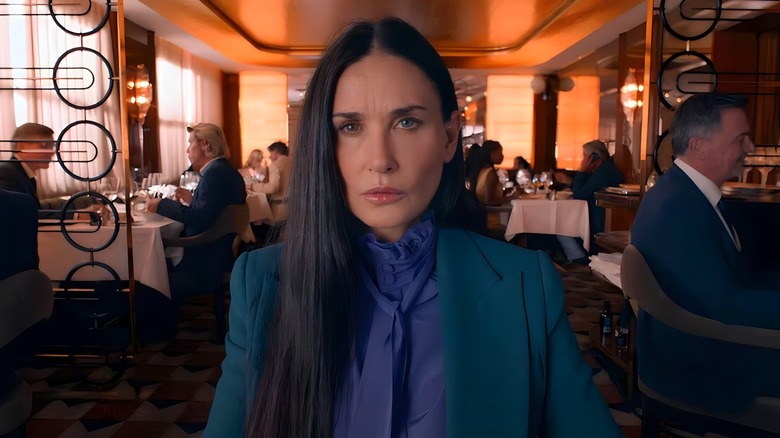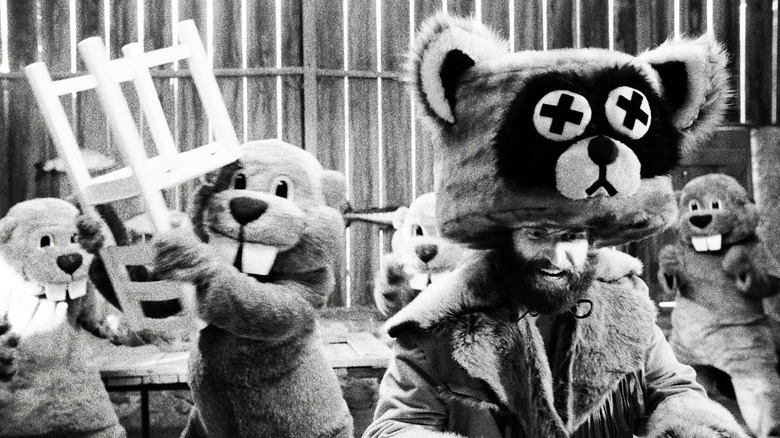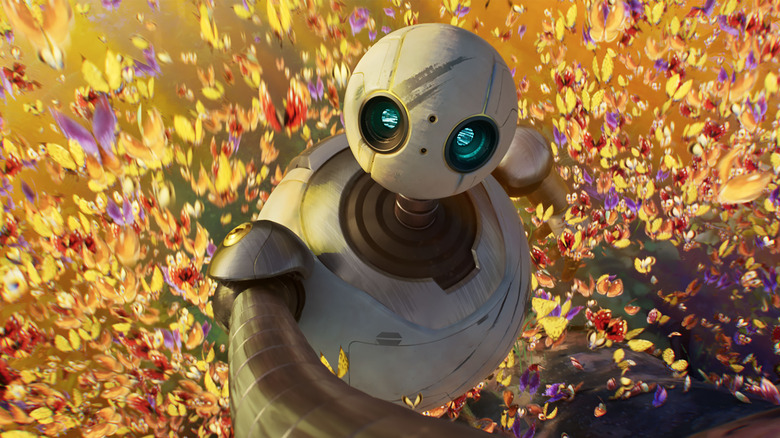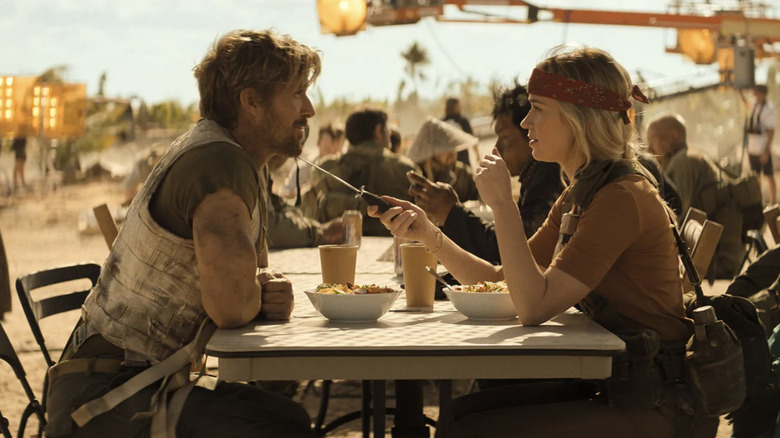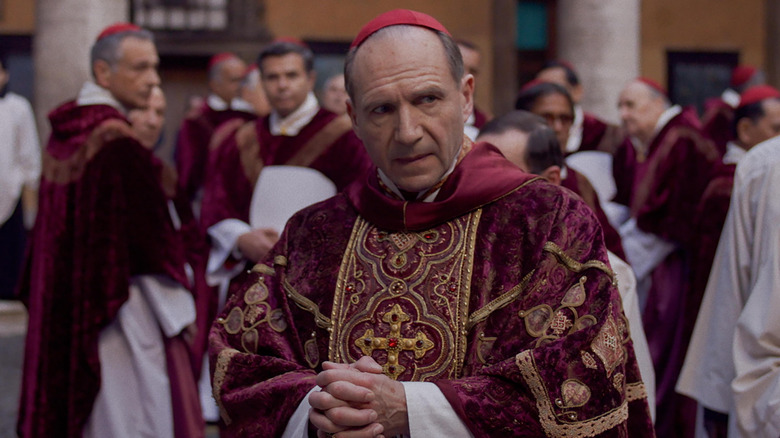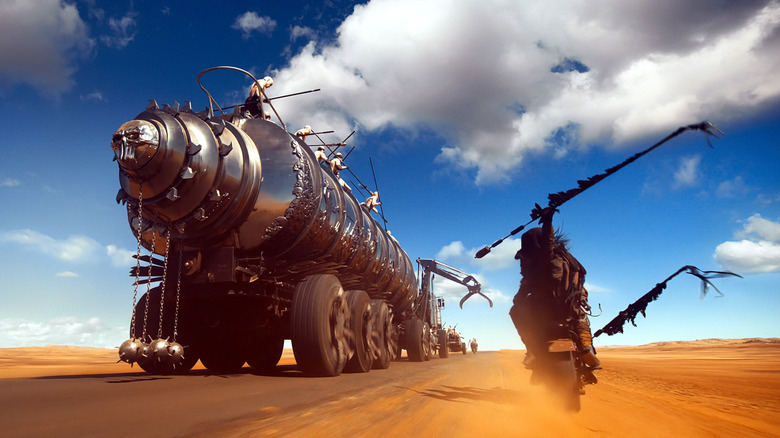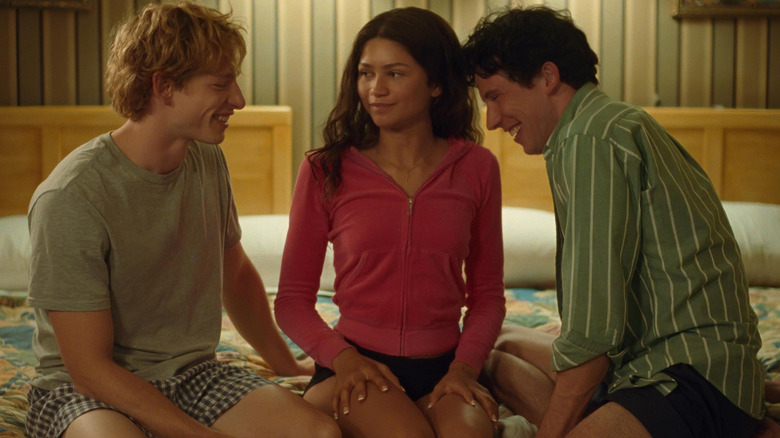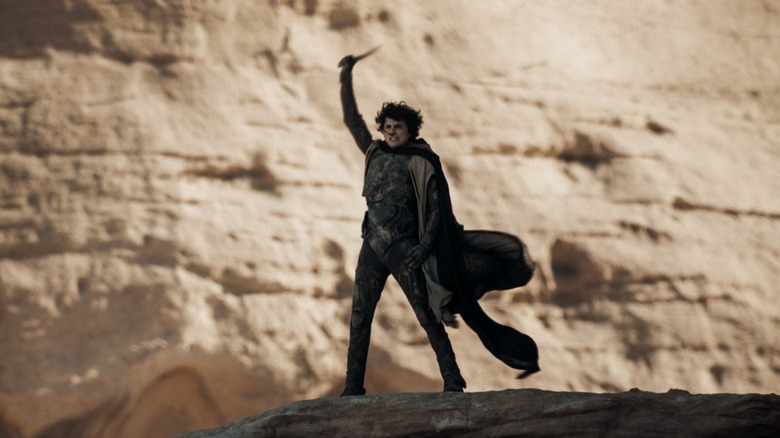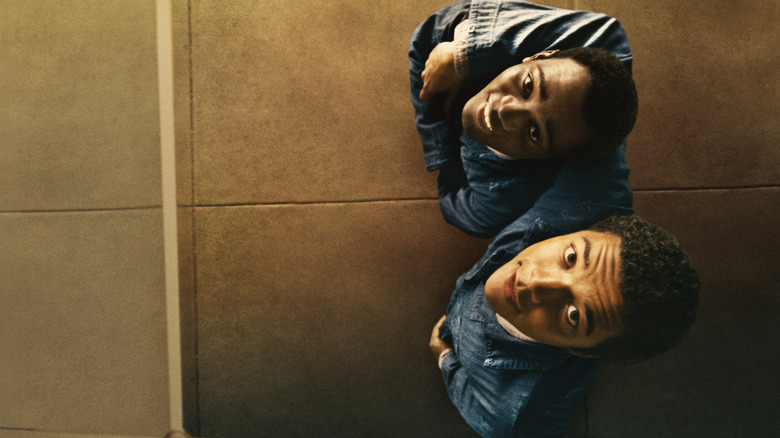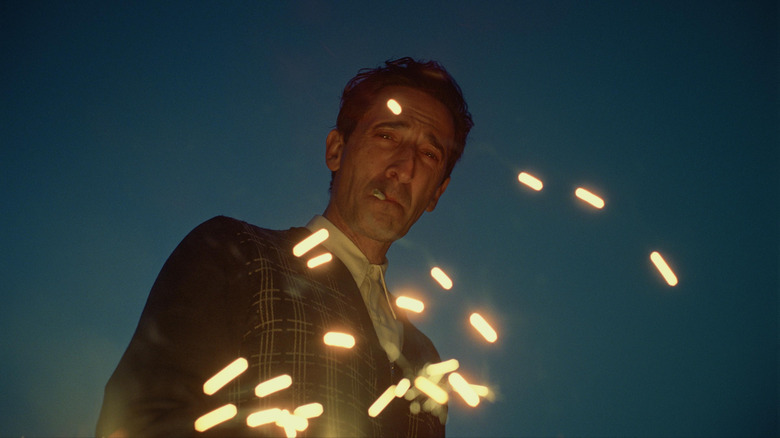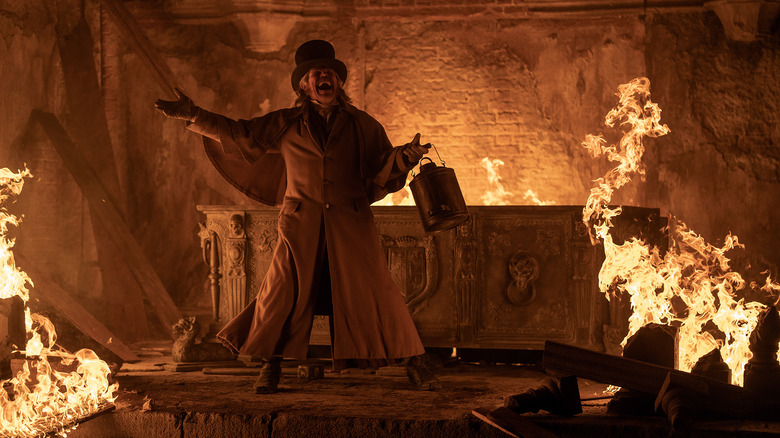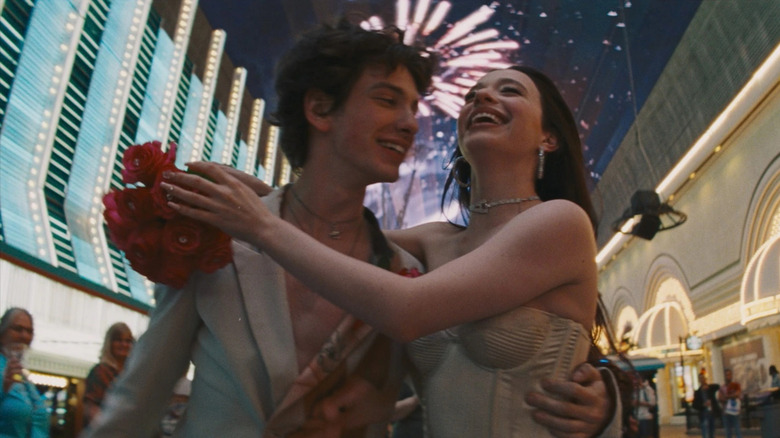The 20 Best Movies Of 2024, Ranked
Every year, movie fans around the world engage in a familiar ritual — the ranking of our favorite films of the year. And every year, we tend to realize the same thing: Hey, this was a pretty dang good year for cinema, huh?
2024 offered all manner of cinematic pleasures, from glossy studio epics to small arthouse projects. This particular list runs the gamut, striving to capture just how varied the great movies were this year. You'll find giant blockbusters alongside tiny indie releases, realistic dramas alongside gory horror movies, some of the biggest hits of the year alongside box office bombs. This varied collection of titles all have one thing in common: They brought us joy and catharsis and everything in-between. They reminded us why we love movies in the first place.
If you're wondering how this list came to be, and why so many titles didn't make the cut, know that we recorded our deliberations, and the audio is now available as an episode of the /Film Daily podcast. But know this much: Your favorite movie that didn't make the list was number 21. We promise.
20. The Beast
The year is 2044. Human beings now live under the suppressive rule of artificial intelligence. The only way to lead a comfortable life is to give in to the machine and undergo a procedure that will erase all emotions from one's consciousness. Gabrielle (Léa Seydoux), a menial laborer who's tired of low-level toil, opts to have her feelings drained, but in doing so comes into contact with memories from her previous existence as a married concert pianist on the verge of an affair prior to the Great Flood of Paris in 1910, and a struggling actor being stalked by a vengeful incel while housesitting in a posh Hollywood Hills home in 2014.
If this sounds like an intriguingly scaled-down riff on the Wachowskis' "Cloud Atlas," you don't know the work of Bertrand Bonello. This means you need to catch up with "House of Tolerance" and "Nocturama," but by all means dive into the deep end first with this wildly ambitious and very loose adaptation of Henry James' novella "The Beast in the Jungle." Bonello's romantic sci-fi epic is a strange, frightening mélange of dystopian dread and deep cinephilia. Bonello draws us into his dream-logic narrative by indistinctly referencing films as disparate as "Blue Velvet" and "Titanic;" we sense their presence in the film rather than spot them like easter eggs. It's a mesmerizing, tragic, ecstatic experience, one that will stay with you for a long time due to its unforgettable finale (and one of the best closing credits sequences in film history). (Jeremy Smith)
19. Love Lies Bleeding
After director Rose Glass successfully broke audiences' brains everywhere with her mesmerizing "Saint Maud," there was no telling where this budding auteur would take us next. Trading in the damp, clammy weather of London for the sweltering, sweaty, dust-sprinkled badlands of New Mexico, "Love Lies Bleeding" is a sign that there's no sophomore slump for Glass, and she's once again directed one of the best films of the year.
A grimy noir about a mysterious muscle mommy crossing paths with a criminal family dabbling in illicit performance-enhancing drugs and guns, "Love Lies Bleeding" waffles between secretion-soaked scenes of seduction (removing egg yolks has never been more erotic) and graphic depictions of bodily mutilation, all while keeping the tension palpably high with the constant threat of "Okay, who is gonna end up dead and thrown into the bottom of a ravine?"
Kristen Stewart continues to prove why she's one of our greatest actors working today, and as for Katy O'Brian's breakthrough role... Well, I just know Albert Pyun is looking down and smiling. In the same vein as "Saint Maud," this movie will polarize audiences, drawing a line in the desert sand between folks who hate the film's see-it-to-believe-it final act, and those who have good taste. As mainstream cinema becomes increasingly prudish, the pulpy, toxic, "Love Lies Bleeding" is here to save us with sex, violence, and Ed Harris casually eating bugs to keep us on our toes. (BJ Colangelo)
18. Civil War
Although many interpreted "Civil War" as some sort of fawning endorsement of its journalist main characters, the film itself could be read as a scathing critique of the entire profession. Are these wartime photographers really heroes keeping a noble record of the truth, or are they self-centered adrenaline junkies trying to get their next big rush? Is a fully-objective approach to their job possible, or is that even a goal they should be trying to adhere to? "Civil War" is at its most interesting when it's dwelling on these difficult questions, and thankfully it's doing that for most of its runtime.
"Civil War" asks these questions through a world-weary Lee (Kirsten Dunst), whose evolving relationship with young Jessie (Cailee Spaeny) keeps the story grounded even when the dynamics of this war-torn America stretch credulity. "Civil War" isn't about presenting an accurate breakdown of what a second American civil war would look like, nor is it trying to lecture the audience along any partisan lines; it's just a terrifying, beautifully-directed film about a group of photojournalists trying (and failing) to hold onto their humanity amidst the worst road trip ever. Dunst in particular shines bright here, as does Jesse Plemons in the film's most disturbing scene.
Much like "Ex Machina," the 2014 sci-fi thriller also directed by Alex Garland, the seemingly simple plot of "Civil War" gives you a ton to grapple with as the credits roll. There are no easy answers here, and we wouldn't have it any other way. (Michael Boyle)
17. I Saw the TV Glow
Many writers and directors have tried to emulate the surreal weirdness of David Lynch. Few in recent memory have nailed it as effectively as Jane Schoenbrun does in "I Saw the TV Glow." Equal parts supernatural transgender allegory and high-concept "Buffy the Vampire Slayer" homage, "TV Glow" is a haunting slow burn that nearly suffocates its viewers in a world of desperation and suppressed identity.
Justice Smith and Brigette Lundy-Paine might seem stilted at first, or at least painfully awkward as their teenage characters trying desperately to find some queer solace in a TV show about magical best friends. Some of that is just a more surreal rendering of adolescent insecurity, but under Schoenbrun's direction, these slightly "off" performances underscore how the whole world around them feels wrong. The eeriness is emphasized time and again by unnerving wide shots and glints of neon static, creating an aesthetic that perfectly encapsulates the liminal space the characters exist in.
"I Saw the TV Glow" isn't just about people trying to fit into a world that doesn't want to see them. It's about a world — an eternal '90s suburbia, in this instance — so resistant to alternative ways of being that every inch of it turns quietly hostile in the background. And yet, even with a finale that's designed to suck the life out of the viewer, the ending of "I Saw the TV Glow" offers a simple affirmation of optimism: there is still time. (Rick Stevenson)
16. A Different Man
This list is lousy with great movies. Many of them are rather popular or, at the very least, got a great deal of press coverage. I would argue no other movie on this list is more underseen at this moment than "A Different Man." A brilliant and bold slice of dark comedy that deconstructs the very concept body horror like nothing you've ever seen, director Aaron Schimberg's exceptional take on chasing fame is a film that, in a just world, will become a much-discussed classic in the coming years.
The film centers on an aspiring actor named Edward who has facial differences and undergoes a radical procedure to transform his appearance. His new dream face gets him everything he thought he ever wanted before things take an unexpected turn, leading Edward on an obsessive quest to get back what he lost.
Sebastian Stan, known best as the Winter Soldier in the Marvel Cinematic Universe, gives a career-best performance as Edward. This is even more impressive given that Stan also gave another killer performance this year in the controversial "The Apprentice." Adam Pearson is also a revelation here as Oswald, a man who holds a mirror up to Edward to show him that the grass isn't always greener on the other side. One would be hard-pressed to find a better directed, better acted, searing bit of commentary this year. It's remarkable that something can be so bleak and challenging, while also being so uncomfortably funny. It strikes a seldom-seen balance deserving of more praise than one can provide in a couple hundred words. (Ryan Scott)
15. Kingdom of the Planet of the Apes
As modern franchise filmmaking goes, it's hard to do better than the recent "Planet of the Apes" trilogy. So when director Wes Ball's "Kingdom of the Planet of the Apes" was announced, it was met with both excitement and trepidation. Could Ball satisfyingly pick up where Matt Reeves left off? The answer is yes.
Ball boldly moves the action decades into the future, long after Caesar's death, focusing on a world largely devoid of humans. We follow a young ape named Noa who seeks revenge for the death of his father, bringing him face-to-face with a tyrannical ape king named Proximus Caesar. It's a thrilling, visually stunning examination of the horrors of war. It's a complex commentary on the nature of humanity. It also isn't afraid to be its own movie, never living in the shadow of what came before. It's also got one hell of an ending that leaves audiences desperate for more. It's one of those "this is why we go to the movies" movies.
Not that this is too out of the norm for Hollywood these days, but the box office was dominated by sequels in 2024. Nine of the 10 highest-grossing movies of the year are sequels. Sequels are often viewed through the lens of wringing blood from a stone or Hollywood's lack of creativity. "Kingdom of the Planet of the Apes" is proof positive that franchise filmmaking does not have to sacrifice artistic merit — these films can be both legitimate cinema and part of something bigger. (Ryan Scott)
14. The Remarkable Life of Ibelin
Before I watched Benjamin Ree's "The Remarkable Life of Ibelin," I didn't really consider myself to be a person who cries while watching movies. After sitting through the 104-minute spell of uncontrollable, life-affirming sobbing the Netflix documentary seems to cast on the viewer, I might have to revise that opinion.
Normally, a documentary about a Norwegian kid who's dying of Duchenne muscular dystrophy and increasingly isolating himself in his basement apartment should have no business being a heartwarming experience. However, Mats Steen was a person who defied expectations. After his death at 25, Steen's secret life as the beloved "World of Warcraft" figure Ibelin Redmoore unfolds as a moving mixed media journey as his sorrow-ridden family discover how many lives he touched like they were walking through the wardrobe that leads to Narnia.
As Steen's family and the viewer slowly understand how deeply beloved the young man was and how fully he lived his online life, it becomes clear that "Ibelin" isn't really a documentary about a tragic young man with a debilitating medical condition. Instead, it's a story of a human being who embraced the world in ways that circumvented the bad hand life dealt him, and found love and acceptance thanks to his own kind nature. Ibelin might be a musclebound fantasy lord, but Steen's own hero's journey is the one that leaves a surprisingly profound legacy. Good luck not wanting to visit "World of Warcraft" after this stellar Netflix documentary is over. You'll know why. (Pauli Poisuo)
13. Wicked
The fact that "Wicked" — or more specifically, the first half of "Wicked" — ended up as one of the year's best movies is a pleasant surprise. Splitting the movie may turn out to be a terrible (or amazing) idea, but at the very least, Jon M. Chu's take on Stephen Schwartz's blockbuster stage musical is actually really excellent. It's not entirely surprising that Cynthia Erivo is perfectly cast as Elphaba and given free range to show off her explosive vocal talents, but it's still incredible to watch. The practical sets are a wonder to behold and look amazing; it's clear that the actors aren't stumbling around on an empty set with a green screen. Refreshingly, the sound mixing between live and pre-recorded songs is basically seamless. The world Chu builds is enormously ambitious but never feels too big or too daunting, somehow. "Wicked" just works.
This isn't a list of best performances of 2024, but one thing needs to be said here: Ariana Grande is absolutely, breathtakingly great as Galinda (later styled as "Glinda") in the first half of "Wicked." Grande — who's credited by her full name Ariana Grande-Butera — flits through the movie and pays homage to the original Galinda Kristin Chenoweth, hangs from a chandelier, hits astonishingly high notes with ease, and makes sure every breath and movement serve her character. (Even her blinking feels purposeful.) "Wicked: Part Two" has big ruby slippers to fill when it comes out next year, because the first part really is that good. (Nina Starner)
12. The Substance
"The Substance" survived the wrath of a major studio to become an unlikely success story, but you can understand why it made some Hollywood figureheads afraid and uncomfortable. Director Coralie Fargeat's sophomore effort is a grotesque body horror nightmare that boasts scenes that are genuinely stomach-churning, ranging from teeth falling out to gross close-ups of people eating shrimp. Gorehounds will rejoice, but there's more to this carnage than simply trying to make viewers feel physically sick.
Fargeat's flick doesn't hold back with its lambasting of the entertainment industry and its obsession with age, beauty, and attitudes toward women. Executives are always looking for the next young star to put on the screen, and the women who gave their blood, sweat, and tears to build their empires will be tossed aside like yesterday's newspaper. This will always be a topical theme until society changes its thinking, and we need gut-punching movies like "The Substance" to hammer the point home. Demi Moore also gives one of the boldest performances of her career as a star Hollywood has chewed up, and she deserves every accolade she has received.
Growing old is natural, grey hairs and wrinkles don't make us less beautiful, and society's beauty standards are impossible to live up to, especially in shallow, vacuous, for-profit industries. While "The Substance" makes every single body part look disgusting, it does so with the goal of wanting to make everyone feel comfortable in their own natural skin. (Kieran Fisher)
11. Hundreds of Beavers
If Warner Bros. isn't going to give us "Coyote vs ACME," at least we have "Hundreds of Beavers." Though the movie premiered at Fantastic Fest in 2022, it didn't get a proper United States release until 2024, and it's absolutely deserving of being on this list, especially when comedies are often overlooked for year-end lists and, perhaps even more importantly, at a time when studios have largely abandoned big comedies without some kind of high concept.
Shot on an incredibly economical budget with a live-action style that echoes classic cartoons like "Looney Tunes" and the slapstick comedy of silent movies and "The Three Stooges" shorts, the film follows a 19th century applejack salesman (co-writer and producer Ryland Brickson Cole Tews) who loses his entire orchard when a beaver inadvertently results in its destruction. Left penniless in the winter woods, he woefully tries to catch food to survive, and he can't help but be bested by a growing army of beavers, depicted with goofy mascot suits cheaply but meticulously replicated with visual effects.
But the film's low budget approach isn't a bug. Instead, it's one of its most endearing features, along with all of the twisted, cartoonish violence director/co-writer Mike Cheslik executes throughout. It culminates in this fantastic wooden fortress assembly line sequence that just keeps getting better and better. Not only is this movie downright hilarious, but it's also one of the most original and innovative productions we've seen in a long time. (Ethan Anderton)
10. The Wild Robot
Misfits discovering their families in unexpected places. Enemies reaching common ground in the face of a large-scale threat. Nature being a force that's wondrous and ferocious in equal measure. Individuals learning what it even means to love. Filmmaker Chris Sanders has returned to these threads again and again in his work, resulting in some of the greatest animated movies of the 21st century. So it's no small thing to say that his adaptation of Peter Brown's novel "The Wild Robot" represents the filmmaker's highest achievement yet.
"The Wild Robot" does what the best animated features do: tell a deceptively simple story that will entertain younger viewers while speaking on a deeper level to the anxieties and experiences of older audiences. It's a heartfelt narrative about motherhood, the struggle to survive in the face of a rapidly changing climate, and our collective desire to become more than what we are "programmed" to be all at once. The Studio Ghibli and Hayao Miyazaki influence is undeniable as well, from the film's rich environmental themes to its breathtaking imagery, which continues the post-"Spider-Verse" trend of eschewing stock photorealism and blends 2D and 3D techniques to make its computer animation feel more personal. Also, Matt Berry voices an eccentric beaver, which immediately makes this better than most films being made right now.
Above all else, "The Wild Robot" believes that we owe each other more than we might care to admit. We would all do well to remember that as we enter 2025. (Sandy Schaefer)
9. The Fall Guy
Move over, "Anyone But You" – this is the rom-com revival we were all waiting for. Sure, "The Fall Guy" is a movie about movies on its surface, a tribute to those who make Hollywood happen in front of and (even more importantly) behind the cameras. Yet it's also a proof of concept for what Hollywood can achieve at its best: beautiful and glamorous movie stars portraying believably down-to-earth people with oodles of romantic chemistry, big-budget spectacle, pathos and melodrama, wry and intelligent humor, and, of course, huge explosions. That director David Leitch, writer Drew Pearce, stars Ryan Gosling and Emily Blunt, and the entire team manage to do all this while indulging one of Hollywood's current creative crutches — the exploitation of pre-existing IP, in this case the 1980s ABC series of the same name — is one helluva stunt.
Yes, the movie underperformed at the box office, and that may be due to some wonky marketing. There's little doubt that it will continue to gain an audience over time, however, given the sheer quality of the film. It's a movie that rewards rewatches, not just for the gags you may have missed or didn't get the first time, but for the truly impressive, Oscar-worthy stuntwork on display. There's a sort of karmic balance to the poor reception of "The Fall Guy"; like the Unknown Stuntman, it didn't get the glory it deserved right away, but it'll be there for us to marvel at and enjoy forever. (Bill Bria)
8. Conclave
What an election season movie! "Conclave" is about a electing a new pope, not a president, but Cardinal Lawrence (Ralph Fiennes) and co. speak the language of politics. The Cardinals sort themselves into liberal, moderate, and conservative wings, the reactionaries make themselves demagagoues, and the progressives drop their principles in the name of shoring up the center and blocking the right wing from power. ("Conclave" author Robert Harris is a former political journalist for the BBC.)
Not that the movie is out to make a statement; the politicking is to amp up the stakes, for this Conclave is a den of vipers in vestments. The papel election also becomes the mere framework of an Agatha Christie-style locked room mystery, with Lawrence as a reluctant Poirot sniffing out corruption and foul play. Though it never tips its hand with a music cue or pratfall, "Conclave" is also a black comedy. Fiennes, drawing on his performance as M. Gustave in "The Grand Budapest Hotel," holds the film together as the straight man forced to suffer fools.
Speaking as a lapsed Catholic, I'm drawn to films set in Catholic institutions or around Catholic faith, where characters wrestle with tenets and contradictions. "Conclave" gave me little new perspective there (beside Lawrence's speech praising the virtue of doubt), but was I entertained? God, yes. This is the sort of "movies for adults" we need — half-camp, prestige coated thrillers — down to it being based on a page turning novel with a final twist that'll leave your jaw on the floor. (Devin Meenan)
7. Furiosa: A Mad Max Saga
The centerpiece of "Furiosa: A Mad Max Saga" is a lengthy siege battle sequence between a monster oil tanker with a maelstrom of medieval flails defending its rear, and an attacking force of motorbikes, parachutists throwing exploding spears, a flame-spewing hang-glider, and a flying Harley Davidson ridden by a horned menace called the Octoboss. Welcome back to the Wasteland!
There are movies with great stories, and movies with great action, and movies that have both. But few filmmakers have managed to marry the two: using great action as the medium to tell a great story. "Mad Max: Fury Road" mastermind George Miller is one of those rare filmmakers, and "Furiosa" is not only a worthy follow-up to its predecessor, but tied with it in first place as the best entry in the franchise.
As with all the "Mad Max" movies, it's the ensemble cast that truly brings this post-apocalyptic world to life: characters with names like Toe Jam, Scrotus, Piss Boy, and the Smeg. But "Furiosa" is also anchored in fierce performances from Alyla Browne and Anya Taylor-Joy as the titular character, in Chris Hemsworth's endlessly entertaining antagonist, and in an unexpected and heartbreaking love story that blossoms in the harshest of environments. (Hannah Shaw Williams)
6. Challengers
There's no other way to put this, really: "Challengers" rules. Luda Guadagnino's film about tennis and sex — and how the two constantly intertwine — lets Mike Faist, Zendaya, and Josh O'Connor straddle two timelines, giving the audience insight into how the three tennis champions first met in 2006, how they interact across several years, and their constantly shifting romantic entanglements. As Tashi Duncan — a promising young tennis players whose career is cut short by a knee injury — Zendaya sneers and snarls like an apex predator as she reaches adulthood, micromanaging her US Open-winning husband Art Donaldson (Faist) and emotionally battering Patrick Zweig (O'Connor) whenever they see each other (although the emotional battery is, true to the movie's spirit, weirdly hot). Faist doesn't have quite as much to do as Art, but he's an excellent performer nonetheless, and O'Connor's cocky, swaggering Patrick is a delight to behold.
The way Guadagnino and cinematographer Sayombhu Mukdeeprom shoot the movie is also critical to its success; the way it lingers on Patrick's thighs or Art's sweat is both ridiculous and incredible, and there's a sequence where the camera is inside a tennis ball that's probably the most creative thing I've seen all year. Atticus Ross and Trent Reznor's high-octane score is just the cherry on top (walk down the street with that in your headphones and you'll feel like you can wrestle a bear). "Challengers" is funny, wildly hot, and gorgeously made ... and it's easily one of the best movies of the year. (Nina Starner)
5. Dune: Part Two
One of the most influential and praised science-fiction books of all time finally got the adaptation it deserved, and it blew away all expectations and doubts. Denis Villeneuve already amazed audiences with the first part of his epic adaptation of Frank Herbert's "Dune," but it is "Dune: Part Two" that truly shows the brilliance of his vision. This is not just a stunningly beautiful film, and not only an action-packed epic where giant worms ride into battle, but a poignant and bleak cautionary tale about messianic figures. It is in this aspect that "Dune: Part Two" really shines. Rather than turn Paul Atreides into a hero of the people, the film interrogates his rise to power at every turn, doubling down on the themes from "Part One" and the novel alike, and reminding us constantly that his road leads to doom for billions. The film also does a wonderful job of giving the spotlight to smaller characters, like showing Stilgar's turn to fanaticism as cartoonishly funny yet terrifyingly accurate or turning Chani into Paul's biggest critic in addition to his paramour.
"Dune: Part Two" is a masterclass in adapting a seminal work of literature. Like "Lord of the Rings," it feels like a monumental piece of filmmaking, one that combines unparalleled spectacle with a powerful and poignant story. (Rafael Motamayor)
4. Nickel Boys
We see a lot of movies every year, and when so many of them feel the same, any time a director comes along and shakes things up by doing something new or unexpected feels like fresh, clean air filling our lungs after having nearly drowned in quicksand. RaMell Ross gave us that rejuvenated feeling with "Nickel Boys," his profound and profoundly moving character study of two young Black men forced to attend an abusive and downright evil reform school in 1960s Florida. First-person POV camerawork has been utilized before, but rarely to such powerful effect; the alternating perspectives of Elwood (Ethan Herisse) and Turner (Brandon Wilson) are employed masterfully here, bringing us closer to these characters and underlining their relationship to each other as beacons in a hellish environment.
Plus, not to put too fine a point on it, but the story of a guy who's been beaten down by the world being inspired by a friend who is willing to do what's right no matter the consequences feels particularly relevant given how generally distressing 2024 was in general. And man, that ending — without spoiling things, the final few minutes contain an emotional gut-punch wrapped in a whirling, buzzing montage. It's the type of filmmaking that makes you feel like you're levitating while watching it, and considering this is only Ross's first non-documentary feature film, we can't wait to see what he does next. (Ben Pearson)
3. The Brutalist
"The Brutalist" isn't based on a true story and its subject László Tóth isn't a real architect (call it Lydia Tár Syndrome, which seems to afflict at least one major film every few years), but it's fitting that the lines between fact and fiction blur so seamlessly together in one of the greatest movies of the year. Director Brady Corbet spent years performing the Sisyphean feat of rolling this old-fashioned, independently-financed epic up the Hollywood hill until it became a reality, and the results are nothing short of jaw-dropping.
On the surface, this is a sweeping saga about a Holocaust survivor emigrating to the United States to ply his trade, provide for his family, and carve out a humble foothold in the land of opportunity. Look beyond the mere blueprints, however, and suddenly this ambitious drama transforms into a personal portrait. Taking after the architectural style that provides its own title, "The Brutalist" is about the push and pull between brutalism versus realism, power versus fragility, and optimism versus obsession. Adrien Brody unleashes one of the finest performances of his career as Tóth. Scene-stealing supporting star Guy Pearce isn't far behind, breathing life into wealthy industrialist Harrison Lee Van Buren who contracts Tóth to design and construct a revolutionary community center as a monument to his ego.
It's in all these details (and more) that "The Brutalist" soars higher above so many others this year, delivering nothing short of a landmark in American cinema. (Jeremy Mathai)
2. Nosferatu
Robert Eggers has been talking about making his own version of "Nosferatu" for years, and now that it's finally here, we can say it was worth the wait. With "Nosferatu," Eggers, a filmmaker who specializes in telling horror-adjacent stories rooted firmly in the past, was presented with the challenge of making his version of this classic vampire story stand on its own two feet. Not only was the filmmaker remaking F. W. Murnau's 1922 silent classic, he was also contending with seemingly every "Dracula" movie adaptation you can think of. And yet, despite this daunting task, Eggers' "Nosferatu" delivers. The story is more or less the same as Murnau's movie, but Eggers adds his own eccentricities to the material, creating a swooning, gothic nightmare that manages to be genuinely scary. Lily-Rose Depp is something of a revelation playing a doomed, melancholy woman who draws the attention of Bill Skarsgård's ancient living corpse, setting off a chain of events full of death, plague, and psycosexual drama.
A triumph of production design — the sound work is impeccable, Robin Carolan's score is beautiful, and Jarin Blaschke's cinematography is both haunting and gorgeous — Eggers' "Nosferatu" is so impressive because it takes something familiar and makes it seem unique and scary. A lifetime of horror movies has left me desensitized, and yet multiple moments in Eggers' film gave me the creeps and left me thirsting for a rewatch. (Chris Evangelista)
1. Anora
A film as unclassifiable as "Anora" has no right to be this entertaining, this crowd-pleasing, this tragic, this funny, and this devastating. A blend of screwball comedy, whirling romance, keen satire, and high-stress thriller, writer/director Sean Baker's masterpiece justifies its epic runtime by cramming every moment, every frame, with emotion, nuance, and visual comedy. It's a blend that serves to remind you why you love movies to begin with, the kind of film that sends you out of the theater soaring, ready to talk about its many highlights and to debate that gripping Rorschach test of a final scene.
Mikey Madison delivers the kind of performance that shapes an entire career as the title character, a sex worker whose unlikely romance with the son of a Russian billionaire sends her spiraling into a joyful adventure before she plummets into a nightmare equal parts harrowing and hilarious. Baker knows he has a star-making performance here, and it's through Madison's eyes that we explore comedic set pieces built upon riotous laughs, a staggering surprise romance so low-key that many viewers don't notice it's happening until deep in the third act, and a blistering examination of how all working folks, from strippers to housekeepers to incompetent henchmen, have to serve someone (but they don't have to like it). What a movie. What an experience. (Jacob Hall)
